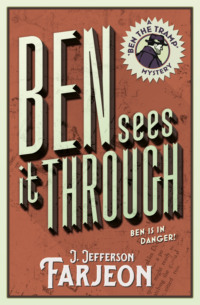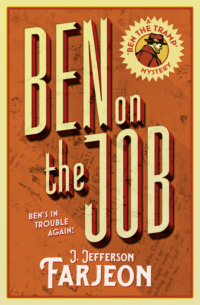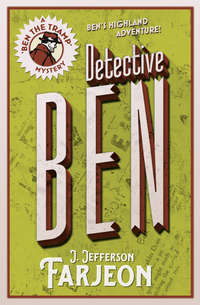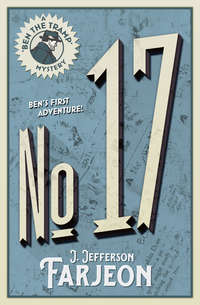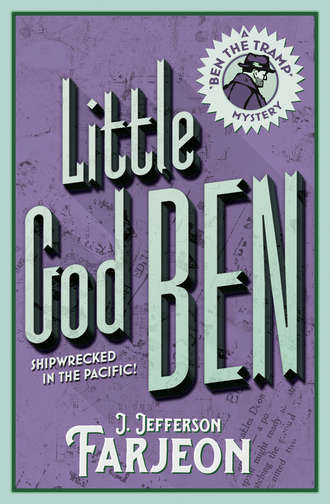
Полная версия
Little God Ben
‘Lumme, we’re goin’ ter git it!’ gulped Ben.
He turned to complete his interrupted journey. Perhaps it seemed a little footless now. The Captain on his bridge did not need the information of a fireman that the weather was not fine! But, having started on his ridiculous mission, Ben wanted to finish it. He had detached himself from normal, sensible routine, and he was like a bit of homeless, wind-blown chaff. Things beyond his power were buffetting him about, and he would have to go on being buffetted about until he was buffetted to rest.
He might have hesitated, however, if impulse had not caused him to turn his head for one more glance over the starboard bow, towards the oncoming rain. In that glance he saw what the girl had seen; and because it was closer, and because his eyes were more experienced, he interpreted it before it was wiped into oblivion again.
‘’Eving ’elp us!’ he gasped.
And he sped up the third companion-way to the boat deck.
As he did so the Junior Wireless Officer emerged from the wireless-room aft and began walking hurriedly towards him. The Junior Wireless Officer had a T T T message in his hand—a message which ranks second in importance to an S.O.S.—but Ben did not know this, nor would he have paused if he had. He paid no attention to the approaching officer, or to the notice that warned passengers and unauthorised persons away from the Captain’s deck, or to the unspeakable transgression of mounting the ladder without permission to the bridge. In a flash he was on the Captain’s deck and clambering up the ladder. The Junior Wireless Officer saw him, stopped dead for an instant, and then came forward again at increased speed.
The Captain also saw him. He was standing on the bridge with the First Officer, and he was looking very grim. His grimness increased tenfold as Ben’s head popped amazingly into view below him.
‘What the hell—!’ bawled the First Officer, speaking the Captain’s thoughts.
‘Something ter report, sir!’ Ben bawled back.
As his head rose higher the First Officer seized it and spun it. Ben felt like a top. He had not finished spinning before he received a fresh impetus from below, and found himself projected towards the starboard cab. It was the Junior Wireless Officer, mounting the ladder at express speed.
The Junior Wireless Officer’s voice, however, was contrastingly composed. The wireless-room permits itself pace, but never panic.
‘Navigation Warning, sir,’ said the Junior Wireless Officer, saluting and holding out his envelope.
The Captain took it and opened it.
‘Hallo—floating wreckage,’ he exclaimed, glancing at the First Officer. ‘Latitude—’
‘Lattertood ’Ere and Lojitood ’Ere!’ bellowed Ben. ‘Unner the surface—water-logged—I jest seed it orf the starboard bow!’
Then the starboard bow got it.
3
The Fruits of Panic
Ben never learned what happened immediately after the submerged wreckage struck the ship, for the impact toppled him over to the deck just beneath the bridge, and the suddenly descending rain pinned him there with the effectiveness of a vast moist weight. He never learned that, although water poured through the wound in the ship’s side, flooding it with devastating rapidity, shifting cargo, bursting fresh cracks, and eventually sending the ship to its doom, not a single life was lost. That was another story, not Ben’s; and, incredible though it was, Ben’s story was the more incredible. Indeed, since Ben was destined like the rest to continue life, no one could have predicted the circumstances that coupled his continued existence with such enduring ignorance.
Above him, as he lay on the edge of his biggest adventure, the Captain was staggering to his feet. The Captain, the First Officer, and the Junior Wireless Operator had also been bowled over, and the two former had only one thought in their minds. The Captain was the first to regain himself and act upon it. He staggered towards the lever that worked the water-tight doors. He was too late, however. His half-blinded eyes watched the indicator move to ‘Quarter-shut’ and ‘Half-shut’—and there it stopped. ‘Three-quarters-shut’ and ‘Shut’ were unattainable goals. Something had jammed.
Below, human pandemonium joined the pandemonium of the elements. It is perhaps less discreditable than is popularly imagined by critics in comfortable arm-chairs that certain people should develop panic during the first moments of a wreck. In this case the damage had occurred with nerve-shattering suddenness, and quite a number of folk lost their heads. It was during this preliminary period, which would have spelt complete chaos had it endured, that two incidents occurred beyond the control of a ship’s discipline.
The first incident occurred at one of the boats. There was a mad, unintelligent rush for it. A few people scrambled in. The Third Officer, followed by Ruth Sheringham whom he had been conducting inside when the crash occurred, did his best to stem the rush, and then to organise it. ‘Yes, get in, get in!’ he shouted to the hesitating girl. As she climbed she stumbled, and he lurched forward to her assistance. The mad crowd behind him carried him forward with her. The ship heaved, the boat swung outwards, partly through the violent movement of the ship and partly through the insane work of clumsy, frenzied hands at the davits. Something gave way. The boat slid down, and the ocean rose dizzily to meet it. As the boat smacked the water, and the Third Officer endured the worst moment of his life, he bawled. ‘Unhook! Unhook! Release the hook!’ He was releasing one as he bawled. He told Ruth Sheringham later that she had unhooked the other, but she had no memory of it. The great, wounded ship towered over them. It shot away from them. Somebody was sick …
That incident was noticed, and served as an awesome example to quell the panic on board and substitute a sense of numb discipline. The second incident was not noticed. The same violent lurch that had sent the little boat down also sent Ben down. In perfect, unprotesting obedience to the laws of gravitation, Ben rolled along the sloping deck, bounced, and shot into the Pacific.
He sank like a log. He rose like the Great War. The sudden immersion somewhat anomalously brought him back to life, and his arms and legs worked as arms and legs had never worked before. He was unable to swim but he had an excellent sense of self-protection, and it told him that he would not sink so long as he kept every part of him moving at the same time. Possibly the sea held him on its surface for a while out of sheer interest. It did not often receive such astonishing gifts, and he was passed from crest to crest for moist examination. But at last it wearied of him and began to draw him down. Ben, after all, was very small fry for so large a host.
His mould was not that of the hero who dies but once. He was the coward—and the first to admit it—who dies many times before his death, and he now added another demise to his unfinished record. In the space of five seconds he died, went up to heaven, was thrown, went down to hell, was thrown up, wondered who wanted him, decided to speak to God about it, climbed a golden ladder, told God it wasn’t fair, asked if he were going to receive the same treatment in this new world that he’d received in the last, asked why it was so wet, asked why it was so cold, asked why everything was bobbing up and down, asked whether he were on a blinkin’ dancing floor, thought of the girl in the blue frock—and then found the girl in the blue frock looking at him. Of course, it was impossible!
‘Oi!’ he sputtered. ‘Wot’s ’appenin’?’
‘Sh!’ replied the impossible vision.
‘Yus, but I ain’t ’ere!’ he protested.
Another voice answered him.
‘We picked you up. Stay still, and don’t talk.’
It was the Third Officer’s voice. Quiet and commanding. But a shower of water spilling over a great watery wall was more effective in securing Ben’s obedient silence.
He gave up trying to work things out. He was in a boat. The boat was racing up and down mountains. That was enough to go on with.
Time passed. The boat continued to race up and down mountains. He lost count of both time and the mountains. They seemed endless. He also lost count of himself. He had been through a number of shattering evolutions and his saturated form was full of bumps and bruises. If one detached one’s mind from the past and the future—particularly the future—and regarded oneself as a sort of tree-trunk, it was pleasant to remain inactive and do nothing. Ben’s spirit drifted while his body tossed.
Grey became dark grey. Dark grey became black. In blackness, Ben opened his eyes again.
‘Oi!’ he mumbled. ‘Wot’s ’appenin’?’
‘If you ask that again,’ replied the Third Officer, ‘I’ll scrag you.’
‘Any assistance you desire in that line,’ came another voice, ‘will be gladly offered.’
That was Lord Wot’s-’is-name. So he was in the boat, too, was he?
‘’Oo’s arst wot agine?’ murmured Ben.
‘Every time you open your eyes,’ Lord Cooling informed him, ‘you ask what is happening. This, I think, is the tenth occasion. It becomes slightly monotonous.’
Ben had no recollection of the other nine times.
‘Well, wot is ’appenin’?’ he inquired.
‘Can’t someone keep that fellow quiet?’ groaned a man at the other end of the boat. He was a film star, who concealed his modest origin under the name of Richard Ardentino. The public would not have recognised his voice at that moment. In a film of a wreck it had been very different.
‘Don’t excite him, don’t excite him!’ exclaimed another sufferer, who had never attempted to change his own modest name of Smith. ‘If you do, he’ll only upset the boat!’
The reference to excitement produced the condition. Smarting under a sense of the world’s injustice, Ben suddenly became emotional.
‘Why ain’t I ter be told nothin’?’ he cried. ‘One minit I’m on the Captin’s bridge—nex’ minit I’m on the deck—nex’ minit I’m in the sea—nex’ minit I’m ’ere! Corse, that don’t matter! It ain’t int’restin’! And if nex’ minit I find meself on top o’ the Hifle Tower, that’s orl right, I mustn’t arsk no questions, carry on!’
He had raised his head to offer this protest. Now he sank back, coming to roost—though in the dark he did not know this—in the lap of the girl. The Third Officer replied, quietly:
‘Take it easy, sonny. I expect you’ve been through worse than the rest of us, but we’re none of us having a picnic. What’s happened is that the ship has been wrecked and that we have been saved, so let’s all be grateful and leave it at that for the moment, eh? As a member of the crew, you’ll know I’ve got a job on, and that I need discipline to carry it through.’
‘Sorry, sir,’ muttered Ben. ‘Blime the bump on me ’ead.’
The boat slid down into a watery trough, took a dose, climbed to the next crest, shivered, and slid down again. Ben was forgotten.
Then passed a succession of hours that were devastating in their varying hopes and fears. If this were a saga of the sea, each hour would be described in detail. If it were a treatise on psychology, the effect on each separate nerve-centre would be analysed and ticketed. But our tale does not aspire to be a classic or a work of reference. It is merely an amazing adventure, which did not separate itself from other adventures and gain its own individuality until a night and a day and then another night had passed, until storms had been endured (one, during the second night, of special violence), until winds, tides and rain had driven the boat across countless miles of unknown ocean, and until the terrifying monotony of the hazardous voyage came to a conclusion.
It came to a conclusion just before dawn on a dark, unseen beach. Though unseen, the beach was heard, and the Third Officer’s eyes—the only eyes that had never closed—strained fruitlessly to pierce the booming blackness. ‘This is the end!’ he thought. But he did not relinquish his efforts. For thirty-six hours he had kept the boat right side up, and now he steeled himself for the stiffest test of all. He gave a few quiet orders as the boat rushed onwards. A black mass rose and missed them by a few feet. He managed to avoid another by inches. Rock scraped the boat’s bottom. The boat shivered, then lurched forward again. Ahead were more black masses, and a shouting white line. The boat raced through the line, hit something, staggered, swung round, reared and kicked. It could advance no farther, but the kick shot its human contents towards the goal it could not reach …
Ben descended in a shallow, sandy pool. ‘Now I am dead—proper this time!’ he decided, as the pool shrieked around him. Finding that he wasn’t dead, he rose with a bellow and scrambled forward. Did someone pull him along as he went, or did he pull someone along? He did not know. All he knew was that the five oceans were after him, excluding the considerable portions he had swallowed. Those were with him.
Then he tripped over something and fell flat.
4
What the Dawn Brought
Ben had something of the ostrich in him. When he fell flat he remained flat, hoping that trouble would pass over him. He remained flat now.
Nothing happened. This, in a world where nine-tenths of the happenings were unpleasant, was satisfactory. A condition not to be disturbed. He stayed where he was till he forgot where he was, and drifted into a series of entirely new adventures. The only one he remembered when he returned from them to consciousness was a unique journey in a boat made entirely of cheese. This should have been agreeable, since he liked cheese and was very hungry, but every time he ate the cheese he made a hole in the boat and the sea poured in. It was the sea that woke him up. Dampness slid round his boots and along to his knees. The cheese, on the other hand, vanished, and in its place against his mouth was sand.
He turned over and sat up. Around him were vague forms, enjoying the lethargy from which he had just emerged. In the dim light of dawn he counted them. Six wet little heaps. With himself, seven. He, the seventh, was the most conspicuous but the least complete. Recent rigours had deprived him of all garments above the waist, betraying the tattooings of a regretted youth.
The heap nearest to him was Lord Cooling. His leg was only a few inches away, and the once-immaculate trouser was rucked up, revealing a sodden sock and suspender. Another heap, almost as close, was Ruth Sheringham. She, also, showed more leg than seemed to Ben respectable. He wondered whether he ought to do something about it. The other heaps were not, to him, identifiable; but we may identify them, and compare them with their normal attitudes.
One was the film star, Richard Ardentino; his normal attitude was splendidly erect, with face raised to the light. One was Henry Smith; his favourite attitude was under a suburban rose-arch (he grew the best roses in Wembley), or playing cards in the 8.59 to Broad Street. One was Ernest Medworth, whose more familiar attitude was poring over Stock Exchange figures to discover whether, scrupulously or otherwise, they could be turned to his advantage. And the last was Elsie Noyes. Her attitude was best expressed at the head of a line of girl guides …
‘Yus, but where’s the Third Orficer?’ wondered Ben suddenly.
He should have made an eighth little heap.
The absence of the Third Officer began to worry Ben even more than the absence of skirt over Ruth Sheringham’s leg. He rose slowly to his feet, and peered beyond the heaps.
He could not see much. Just a misty, creepy dimness. A grey veil that screened—what? Away to the east, beyond the wicked breakers and across the heaving sea, faint light began to illuminate the horizon, but here the grey veil still reigned supreme, concealing all but the nearest objects.
‘It’s narsty,’ thought Ben.
Nevertheless, he stole forward, slowly and uneagerly, stepping carefully among the mounds and envying them their immobility. He had been much happier before he had ceased to be a mound himself. But somewhere through that grey veil, Ben decided, was the Third Officer, and if he’d got into trouble—well, somebody would have to find him, wouldn’t they?
As he advanced, turning his back upon the shore, the dimness became more creepy. It seemed to be full of ghostly slits, and he did not know whether the darkness in front of him were cliff, wall, or forest. Something ran over his foot. By insisting it was a crab he just saved himself from screaming. But even crabs weren’t nice. Some of these Pacific blighters had claws that …
‘Wozzat?’ gulped Ben.
He leapt, and then stood stock still, while another panic passed. The new oppression had seemed like a figure. Not the Third Officer’s figure. A figure twice as tall, if not three times; standing motionless. But where was it now? A figure that size couldn’t come and go without a sound! The only sound Ben heard was the thumping of his heart.
‘I better git back,’ thought Ben unsteadily. ‘Yer wants two at this job!’
He turned. The sensation that the giant was now behind him caused him to take a header over a large stone. He dived into two arms. They were the arms of the Third Officer.
‘Lumme!’ gasped Ben.
‘Can’t you stand?’ asked the Third Officer, trying to make him erect.
‘My knees is funny,’ explained Ben.
‘All of you’s funny,’ replied the Third Officer.
‘Well, yer give me a shock!’
‘The shock was mutual.’
‘Oo’s wot?’
‘Never mind. Where are you going?’
‘I ain’t, I’m comin’ back.’
‘Where were you going, then?’
‘Ter look fer you, like.’
‘Very nice of you,’ smiled the Third Officer. ‘Well, now you’ve found me like. Did you find anything else?’
‘Yus,’ answered Ben, with unpleasant recollection.
‘What?’
‘Bloke twen’y foot ’igh.’
‘What are you talking about?’ came the sharp demand.
‘Bloke twen’y foot ’igh,’ replied Ben. Then he added, ‘Mindjer, I ain’t sure wot I seed ’im, but if I seed ’im, that’s wot ’e was.’
The Third Officer frowned, then regarded Ben searchingly.
‘Anything left in the bottle, sonny?’ he inquired.
‘If I ’ad a bottle, there wouldn’t be,’ said Ben.
‘Where did you see this Gargantuan creature?’
‘Oo?’
‘Where did you see this giant?’
‘Be’ind me. ’Ave a look. I’ve ’ad mine, and one’s enuff.’
‘Most kind!’ murmured the Third Officer, and stared over Ben’s shoulder.
Then, Ben gazing east and the Third Officer gazing west, each man saw an interesting sight.
Ben saw the sun rise. It slipped into view over the rim of the world, at first the tiniest curve of gold, then a gradually developing disc. The sea threw off its shroud and woke up. It became a madly dancing expanse of water, with a wide, shimmering path stretching from horizon to shore.
The Third Officer saw what the sun rose on. He saw a forest awaken. He saw the tops of great trees catching the first upward rays. He saw the amber light flow down. He saw Ben’s giant …
‘Wozzer matter?’ jerked Ben suddenly.
The Third Officer did not reply immediately. Then he said:
‘Turn round and see—but take it quietly.’
It has been mentioned that Ben had an instinct for interpreting tones. He knew by the Third Officer’s tone that when he turned he was going to witness a peculiarly unpleasant sight, and for this very sound reason he did not turn immediately. But at last the operation could no longer be postponed with credit to the Merchant Service, and he twisted his neck round, though not his body and his legs. You need those to run with.
The sight that met his anxious eyes was definitely unpleasant. It was, in fact, the giant. Ben had over-estimated the giant’s height, which was nearer ten feet than twenty; even so, it was sufficiently above the average to be impressive. There were, however, other features more disturbing still. The giant’s staring eyes had large white rings painted round them. His great mouth extended almost from ear to ear in a humourless grin. His nose had three nostrils. Ben counted them several times, very rapidly, and there was no mistake about it; he wondered, even in the grip of terror, whether they all functioned.
The one satisfactory thing about the giant was his perfect immobility. He was standing on a pedestal, carved in rock.
‘Coo!’ muttered Ben.
‘In the language of Shakespeare,’ answered the Third Officer, ‘you have said it.’
Then Ben made another discovery. The giant was merely one member of a little family party. The other members—there were four in all, but there surely should have been five, since a fifth pedestal was empty—were of varying sizes. They were all equal in ugliness, however, and they were all staring unblinkingly towards the rising sun, standing out with uncanny brilliance against their background of dense foliage. The points that stood out most brilliantly were the staring optics themselves. They were not of rock. They were gold.
Ben did the only obvious thing. He shut his own eyes very tight, counted ten, and then opened them again. The family party was still there.
‘Yes, I tried that,’ murmured the Third Officer. ‘It doesn’t work.’
‘Lumme!’ whispered Ben. ‘’Ave they come dahn ter ’ave a bathe?’
A voice behind him made him start.
‘Excuse me,’ said the voice, ‘but do you both see what I see?’
A sadly shrunken Lord Cooling stood behind them.
‘We do,’ replied the Third Officer, ‘and we are just discussing theories. My friend here suggests that they have appeared for their morning dip.’
‘Well, tastes vary,’ commented Lord Cooling. ‘Personally, I have lost my enthusiasm for the water. What is the alternative theory?’
‘Fairly obvious, I think,’ said the Third Officer.
‘Yus, Guy Forks fact’ry,’ suggested Ben.
‘These flashes of rare intelligence are a little overpowering,’ observed Lord Cooling, attempting to preserve his dignity by screwing in his monocle. He had saved his monocle, though he had lost nearly all else. ‘May I have your own thought, Mr Haines?’
‘Well, sir—the island’s inhabited,’ answered Haines.
‘Ah! And would you call that an advantage, now—or not?’
‘It does rather depend, sir, on the inhabitants.’
‘Exactly. But are you sure? These examples of art may belong to a pre-Epstein Age? For instance, I understand they exist on Easter Island, which is no longer cannibalistic?’
‘’Ere! Wot’s that?’ jerked Ben.
Haines threw Lord Cooling a warning glance.
‘I haven’t suggested that these inhabitants are cannibalistic,’ he said.
‘I will accept that, with a private reservation,’ smiled Lord Cooling. ‘Perhaps my mind moves rather fast, but I agree that, in any case, one must fit one’s words to one’s company.’
‘Just as well, sir,’ nodded Haines. ‘All the company isn’t present, either.’
‘True, Mr Haines. While I was trying hard not to wake up a few minutes ago, I thought I missed your own company?’
‘I dare say, sir.’
‘Where were you?’
‘Mouching around.’
‘Have you done any mouching in that unpleasant forest?’
‘Not yet. Our stoker is the real pioneer—though he returned from his pioneering rather hurriedly. I was trying to find bits of the boat.’
‘Any luck?’
Haines shook his head gravely.
‘The bits I did find were quite useless. It’s the provisions we want.’
‘Very true. We may not quite appreciate the—er—native fare. Which brings us back to the natives. You’ve not seen any, of course?’
‘No.’
‘Then let us assume the race is extinct.’
‘We can’t, sir. I came upon a footprint or two—and that’s why I’m not too keen on those things!’ He jerked his head towards the statues. ‘Still, we’ll get through this all right. I—I hope, sir, I can count on you for optimism?’


